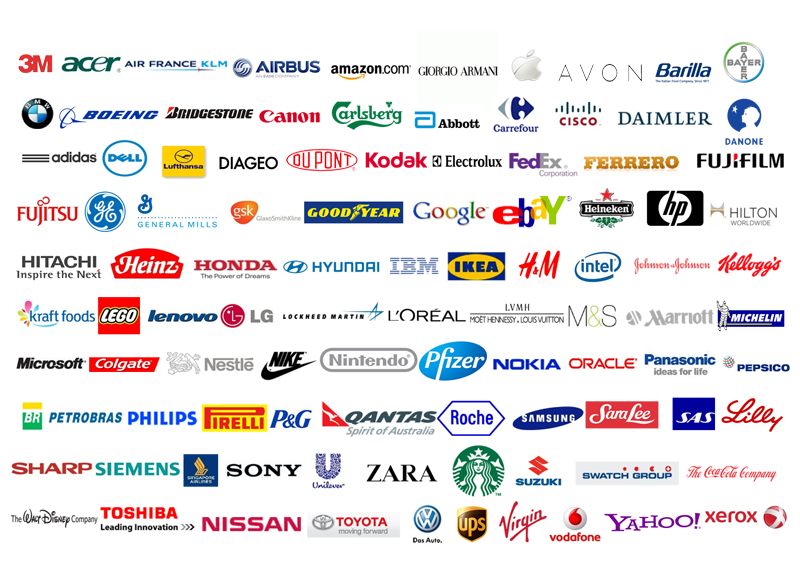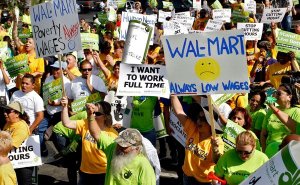
I’ve heard some awfully strange things about corporations lately. Let’s see if we can put to rest some myths being spread by politicians, mass media and yes, people also!
Corporations are not people.
Tens of thousands of years ago, people took up trades. Farmers, fishermen, blacksmiths, millers, carpenters and shoemakers worked hard to offer products or services to each other to create a higher standard of living for the whole community.
Sometimes several people worked together to operate a farm, bring in a haul of fish, or build a house. These groups of professionals gradually evolved into today’s corporations.
But a group of people is not one person. You can say that “Apple did this” or “Exxon did that” but in reality, it was actually one or more real people at that company that made a decision to do something. A company cannot do anything by itself. Decisions are made, and actions taken, by real people, not company logos.
 A company is not your mom or dad.
A company is not your mom or dad.
A company’s only responsibility to you is to give you what they promised when you chose to accept their job offer.
A company has no responsibility to give you health care, vacations, read you bedtime stories, put away money for your retirement, tuck you into bed, pay for your contraception, help you with your homework, give you holidays off or do absolutely anything other than what they explicitly promised.
If a company offers you the best job out of all available options, then you should be grateful for the opportunity.
If you feel you can find a better job offer, then quit and get a job that pays more. This is not greed on your part. It’s a natural part of your career and life.
If you cannot find another company to offer you more money, perhaps it’s time to ask yourself questions like: How hard have you worked to become one of the best in a highly in demand profession? And how many hours per week away from work do you spend studying and improving your job skills and value to a potential employer?
If you devote yourself to striving to be one of the best in a high demand industry, it’s only a matter of time until you find an employer that will appreciate you going above and beyond, and truly caring about the success of the business you work in.
If you think changing jobs is hard, think for a moment about the millions of poor families that came to the USA from all around the world with children, elderly, and little more than the clothes on their back over the last couple hundred years. That might put your first world problem in perspective.
Or, start your own company. Tons of people do this every day.
A company is not your nanny.
A company’s job is not to take care of you. Their job is to do their best to make sure your paycheck does not bounce. Their job is to try and increase their revenues by continually improving the product or service they offer and minimize costs so they stay profitable and survive in a competitive market.
How would you feel if your next door neighbor demanded that you had an obligation to cook them dinner every night? You might protest, saying that you never made a promise to cook them dinner, therefore you have no obligation to.
But if your neighbor cannot ethically demand that you have obligations you never promised anyone, how can you ethically demand that people who work at a company take on obligations they never promised anyone? There are no ethical double standards.
A company is not your college career counselor.
A company is not a charity. A company has no obligation to offer anyone a “living wage.” If a company offers a job, and you don’t like the offer, don’t take the job.
There are only two paradigms of work: one, where you are free to accept any job or not, and the other, where you are a slave. No politician should be able to dictate to you what jobs are available to you. That power should lie with the People.
History proves over and over again that economic freedom results in the greater good. The countries with the greatest economic freedom have always had the highest standard of living for the poorest people. They also have many other benefits, but that’s the one you should care about most.
 Companies are not some collectively owned, public institution.
Companies are not some collectively owned, public institution.
Each company is comprised of a group of private citizens and shareholders who have decided to work together to offer some kind of product or service that they hope the market likes enough to freely pay them for it. A private company is not owned by all citizens, only by the legitimate shareholders, and only the shareholders and managers should have any say in what that company does.
You can say that because you paid taxes that built the roads that the company used to ship their goods, or schools to educate their employees, that you have some claim over them, but that’s not very smart, because you obviously haven’t thought things through. That also means companies have a claim on you because they also paid taxes, and a lot more than you did. If this is a valid and ethical argument, companies will win this one, and own your house and car, so I would say, you really don’t want to go there!
But this is fine, because the free market is a completely democratic, self-policing system. If a company is not producing a product that benefits the community, people will not pay for it, and that company will go the way of Kodak, Blockbuster, Kaypro, Woolworth’s and countless others.
No politicians should have the power to dictate to us by force what companies win or lose, what products we can buy or how much we should pay.
That power should be in the People’s hands and the People’s hands alone.

If you gave a company money, it means they gave you something more valuable in return (or obviously, you never would have made the trade). Now, the thing you bought is yours, and the money is theirs.
How much a company pays their CEO, with their own money, is no more your concern than how much the woman living next door spent on her husband’s birthday gift. In both cases, it’s not your money and none of your business.
Do you think a company has the right to control what foods you cook in the pan you bought from them, where you drive in the car you bought from them, or what music you should listen to on the iPod you bought? Of course not. And, conversely, you have no right to tell them how to spend the money you freely gave them in exchange for the product you now enjoy. You chose to make the trade freely.
 How much money a private company chooses to offer job applicants or employees, or what benefits a company offers, is no more your business, or right to dictate, than what a woman a thousand miles away offers a kid to mow her lawn. Let the kid decide if it’s enough money. If it is, he will mow the lawn, otherwise he won’t. History proves that he best possible outcomes result from when you leave the woman and kid free to work it out for themselves.
How much money a private company chooses to offer job applicants or employees, or what benefits a company offers, is no more your business, or right to dictate, than what a woman a thousand miles away offers a kid to mow her lawn. Let the kid decide if it’s enough money. If it is, he will mow the lawn, otherwise he won’t. History proves that he best possible outcomes result from when you leave the woman and kid free to work it out for themselves.
Companies are not saviors. Companies are not God or the Devil, they are just groups of people trying to produce a product that makes other people’s lives better in some way, to hopefully make a profit, put some money in their pockets and food on their tables. This is not evil or greedy. It is honorable, natural and commendable.
Companies cannot exploit workers.
 A company just posted a help wanted ad offering $1 per year in wages. Did they just exploit every person in the U.S.? Of course not.
A company just posted a help wanted ad offering $1 per year in wages. Did they just exploit every person in the U.S.? Of course not.
Companies will pay the lowest wages they can to hire people with the skills they need, just as consumers will price shop and spend the least amount of money they can to buy things they want and need. This seeking to lower costs by companies and people is not evil, it is actually valuable to the free market, as wages and prices transmit information so companies can make smarter decisions about what product to create, and workers can make smarter decisions about which skills to develop.
A hundred years ago, people understood, and were grateful to companies who offered them an opportunity to earn money and support themselves and their families.
Companies are the “givers” of society. They not only provide the goods and services we need to live, and that enhance our lives, they also provide all the jobs that put food on our tables (yes, even the cost of government “jobs” are paid by corporate profits). Companies also pay, directly or indirectly, all taxes, either directly or through withholding money from paychecks.
But in the last several decades, the spoiled, entitled, selfish side of our culture has taken center stage, where politicians, unions and the media have brainwashed millions of people into thinking companies are somehow the villains of society, greedy leeches soaking up, rather than generating wealth, and government is the generous, benevolent institution. It is bizarre that the truth is precisely the opposite.
A company cannot be a monopoly, as in, “the only place to work” in a town.
This is a myth only a silver-spoon-fed journalist or politician could dream up. Anyone in the U.S. has a thousand employment possibilities if they are willing to do the hard work it takes to develop the valuable job skills required. If you don’t believe that anyone with ambition, regardless of income or background, can become a millionaire if they devote themselves to it, spend an hour listening to the Entrepreneur on Fire podcast. You will change your mind.
Capitalism is not a “rigged game,” as this Treasury report proves.
You can’t tax a company.
This is obvious to anyone who knows basic economics. You can try and tax a company, but that money always comes out of consumer’s pockets in the form of higher prices, making the cost of living higher, and out of worker’s pockets in the form of lower wages.
If you want poorer people to struggle more each month in paying their bills, then try to keep wages low and prices high by keeping the U.S. corporate tax rate the highest in the industrialized world and you will put friction on upward mobility and force a record number of people on public assistance. If you hate poor people, vote for whatever politician keeps yelling that “companies should pay their fair share.”
If you think taxing companies more means money comes out the CEO’s pocket, you really haven’t been paying attention. Higher corporate taxes come out of your pocket. And the USA has the highest corporate tax rate in the developed world.
The more you vote to push the cost of living higher, and push wages lower, the more people will be forced onto the public dole, increasing government expenditures, and raising the cry to hit companies again with higher taxes and more regulations, strangling the golden geese until no one but the rich are financially free.
Why do these myths about companies persist?
 Many of us grew up in homes with parents who paid for our housing, food, clothing and medical care. It was really nice to be taken care of! As long as we obeyed the rules and kept our room clean, we had no worries.
Many of us grew up in homes with parents who paid for our housing, food, clothing and medical care. It was really nice to be taken care of! As long as we obeyed the rules and kept our room clean, we had no worries.
The shock of moving out on our own and having to be responsible for our own needs is devastating. We would much rather that our employers take care of us, or the government, or someone, anyone! Corporations are convenient parental substitutes, hence the need for us to desire that they fill the void left by us not wanting to grow up.
Some people will read this article and feel that it leads to a better, more humane world when corporations are forced to bear all the responsibility in society, not only providing all goods and services, providing all jobs, and paying all taxes, but also providing health care, guaranteed wages, pensions, vacations and an endless list of other demands.
If this is what you feel, study the history of Detroit, once the world’s richest city with the world’s highest wages and world’s highest standard of living with almost no government regulation, taxes or unions, then, after government and unions take over, “America’s first third world city.”
The 60% of children living in poverty in Detroit are a direct result of the devastation caused by progressive policies.
Do people at companies commit crimes sometimes?
 Of course. People who work at a company should be subject to the same laws any person is. If a person in a company decides to dump toxic waste in a river, that person is a murderer and everyone who helped is an accessory to murder and all should be prosecuted like any murderer. Just because the murder or harm happens while a person is at work should not indemnify anyone from punishment. If a person at a company commits fraud by lying about the product they offer, they should be prosecuted for fraud and, if convicted, sent to jail.
Of course. People who work at a company should be subject to the same laws any person is. If a person in a company decides to dump toxic waste in a river, that person is a murderer and everyone who helped is an accessory to murder and all should be prosecuted like any murderer. Just because the murder or harm happens while a person is at work should not indemnify anyone from punishment. If a person at a company commits fraud by lying about the product they offer, they should be prosecuted for fraud and, if convicted, sent to jail.
But making the leap that a person committing a crime at work somehow reflects badly on all corporations is like saying a Hispanic who commits a crime somehow reflects badly on all Hispanics. It is not a rational conclusion. Some people commit crimes. That’s reality. The court system exists to ascertain guilt and assign punishment.
Are the courts in the U.S. perfect? No, far from it, but they’re far better than any alternative.
Are companies guilty of government corruption?
 People criticize corporate executives for making large campaign contributions so those politicians with power over tax money will send a stream of cash back into the company’s coffers with special grants, corporate welfare, sweetheart contracts and other corrupt uses of taxpayer’s money.
People criticize corporate executives for making large campaign contributions so those politicians with power over tax money will send a stream of cash back into the company’s coffers with special grants, corporate welfare, sweetheart contracts and other corrupt uses of taxpayer’s money.
While this is obviously despicable, blaming the executives at the corporations doesn’t solve the problem.
The politician swears an oath to protect the Constitution and devote their lives to serving the People. The corporate executive promises to further the success of their company in whatever legal way possible. The politician is the one violating their oath. The corporate executive is merely keeping their promise they made in their job interview to whomever hired them.
Only politicians can pass laws, hand out public money, give out grants or bailouts. Companies are powerless to do any of these things. Blaming executives for doing their jobs rather than politicians for violating their oaths is understandable, but not rational. Unless you know of a magic spell you can cast that would make all corporate executives refuse to buy favors from politicians when they are freely available, then blaming corporations is not the solution.
The solution:
If you want to get money out of politics, if you want to solve cronyism, the answer is to fix the problem at the source. Simply pass an anti-corruption law to make it illegal for a politician to introduce or vote for a law to favor one company or industry over another. And all laws currently on the books must be phased out.
If an anti-corruption law like this is passed, the problem of money in politics is solved. If there is zero incentive for corporate executives to bribe politicians, then why would they bother, when there’s nothing in it for them?
Thanks for reading!